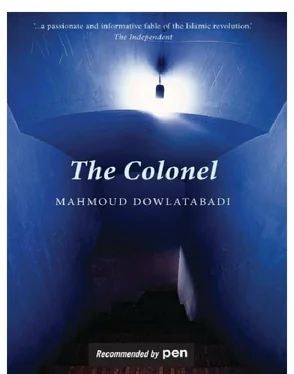“Maybe because of my weakness, my weakness and vacillation and my lack of certainty about anything.”
“No, I don’t think so. No. My decision was in response to my need, and what I need now is to be rescued by my enemies. There has been a revolution, you see. So far, they have strung up seven of our people from the trees along the street, more than seven of our local officers… It’s just my good luck that nobody knows me here. But maybe that’s precisely why I came to this town, to your house.”
Perhaps hoping to stop the conversation right there, Amir simply nodded again and said, “Right.” He still couldn’t look Khezr in the eye. With his professional agility, Khezr now adopted a practised conciliatory tone:
“But some of our people were real bastards, it’s true… particularly the high-ranking ones, who were just looking out for themselves and trying to save their own skins. Lots of them got the hell out of here while there was still time. Then I was arrested. I learned later that some of them had packed their families off abroad a full six months before the prison doors were thrown open. Then they followed them, and hung the rest of us out to dry, leaving us behind as scapegoats for everything that had happened. They sacrificed us to a people who all seemed to have gone mad. It’s obvious now that the higher-ups knew a full year ahead that the game was up, maybe even longer than that!”
Amir was now able to look at Khezr: “Have you resigned?”
It was not in Khezr’s nature to answer questions, and his response was silence. His silence may have emboldened Amir to press him: “Why? Do you still imagine you are protecting something?”
Khezr did not look at Amir: “I don’t know… perhaps I just don’t know any other life. Perhaps because I’ve spent all my life doing this; it’s what I believe in. Perhaps I am just saving myself.”
He looked up, looked Amir straight in the eye. There was an implicit threat in his voice: “Are you certain no one is listening to us?”
Amir nodded, though he was not at all certain: “Apart from Mohammad-Taqi, the only other people living here are Masoud, the colonel and Parvaneh, right?”
“Yes.”
“And Farzaneh lives with her husband Qorbani, doesn’t she?”
“Yes.”
“I know Qorbani well. He knew quite a lot of our informers here. But I don’t trust him. He just waits to see which way the wind is blowing. He’s a pompous idiot. At the beginning, he probably hung around you quite a lot, didn’t he? Yeah… and he thought that your lot would end up on top. As if our lot were already dead and buried!”
“You say what you think, don’t you, Khezr Javid? I noticed that about you when I was your prisoner. Don’t think I’m flattering you, but I have to say that you’ve got some nerve. You’re a brave man. But what I still don’t understand is how anyone could put such qualities at the service of a hellish system like that. What made you do it? What was it all for?”
Javid finished the rest of his tea and reflected for a moment: “My face didn’t fit. My nose was too big.”
“No, I’m serious.”
“And I gave you a serious answer. My nose was too big. It made me want to worship something, so I worshipped the Shah, so my nose made me enter the service of the Shah.” 34But as for a ‘hellish system,’ I have to say that you intellectuals really do exaggerate. You use the most overworked terms for everything, don’t you? Hellish system, indeed. No, if you ask me, that was only purgatory. The real hell is yet to come.”
There was nothing more to be said. They both fell silent. Khezr tucked a cushion under his elbow and leaned back on it. He lit another cigarette and, so that Amir could not see what he was thinking, closed his eyes as if he were having a nap. Amir felt the air around him becoming suddenly heavy, and the dead end to their conversation felt unbearably oppressive. He decided now was the time to confront Khezr, and ask him why he, a security policeman and his former interrogator, had come to his home — when the whole city was alive with rumours, counter-rumours and misunderstandings, which could destroy not just individuals but whole families as well? Did he not think that that might be asking too much? Amir was still weighing his words when Khezr spoke, without parting one eyelid from the other:
“Not all revolutions get off the ground these days, you know. The fate of small nations is in the hands of the superpowers, comrade. So I haven’t given up all hope. You don’t remember the days between 15th and 18th August of ’53, but I do. I was a young man then, counting the minutes for the order to come out into the streets. But then the tables were turned and we saw with our own eyes that Sha’ban the Brainless was sitting there instead of Mossadeq and Khosrow Rouzbeh!” 35With his eyes still closed, he continued:
“Tell them to bring us something to eat, anything. And find a way to tell your family I’m here, without letting on who I am.”
“Where will you sleep? Do you want to spend the night here?”
Khezr did not answer, but just stared back at him. Amir looked down, just as he did when he was being interrogated and had dared to ask a question, only to have Khezr bark back at him: ‘I ask the questions here. You just answer them.’ To escape Khezr’s vice-like hold over him, Amir got up, stuck his head out into the stairway and called up for someone to make them some supper and bring it down. He hoped that Mohammad-Taqi would answer. He guessed that Parvaneh had not yet come home and he knew that, as usual, Masoud would be late back from the mosque because after the mourning ceremonies and prayers he would stay behind to sweep the prayer hall and clean up the pantry and only come home if there was nothing else to do. It was not unusual for Masoud to sleep in the mosque. Which was why, whatever Mr Immortal Prophet Khezr might have preferred, there was nobody except Mohammad-Taqi in the house to serve them. All that Amir could do was to go back and talk to Khezr and distract him from thoughts of Mohammad-Taqi.
I had never got over my wife being taken away by the police and, although I was still in a state of shock at seeing Khezr in the house, I was strangely tempted to take it up with him. I was sure that he must know what her file said about her arrest and interrogation; he must know all about what had happened to Nur-Aqdas Khamami. It seemed perfectly natural that, now that Khezr had taken refuge with me, I should ask him to tell me what had happened to my wife, who had disappeared without trace. But what was it that held me back from mentioning her? I don’t know, but a powerful force was preventing me from uttering my wife’s name. Maybe it was my oriental mentality that made me want to draw a veil over anything that reflected on my honour. All the dreadful images that I had had of what might be happening to Nur-Aqdas had destroyed my mind and left me in a state of terror. I wanted to shut her, and anything that was to do with her, out of my mind. I did not want to see or hear of her again. Nevertheless, my curiosity would not let go of me. It was impelling me to keep digging to find out what had happened to my wife. If the security police had executed her, there had to be some trace of her grave, or of the common pit they had thrown her into. But there wasn’t. So what had happened to Nur-Aqdas? I don’t know. So I don’t see why I shouldn’t put Mr Immortal Javid on the spot and get him to answer me. Wasn’t he now a criminal hiding in my house? So why didn’t I quiz him? Was it that I didn’t dare? That was it. I didn’t have the courage to ask the policeman personally responsible for her file what had become of Nur-Aqdas. I was hesitant, and maybe this shyness came from a sense of shame. This was nothing new; when other people behaved totally disgracefully, it was me that went red with embarrassment. What was holding me back was perhaps this overweening sense of shame. I just sat there on the stool, staring at the floor, and started thinking about Nur-Aqdas. I remembered the first time I saw her, with her eyes blindfolded, her feet swollen and bandaged, sitting on an old blood-soaked chair in one of those deformed, twisted prison cells. She was leaning backwards and I wanted to be able to see her eyes under the black blindfold once more. They had probably lost all their brightness, and I wanted to be able to look out through the half-closed door of that warped interrogation room, to see what hour it was of that night that seemed to have had no beginning. Then suddenly, I don’t know how, I was no longer tongue-tied but, instead of asking Khezr what had happened to Nur-Aqdas, all I could manage to say to him was, ‘What’s the time?’
Читать дальше












